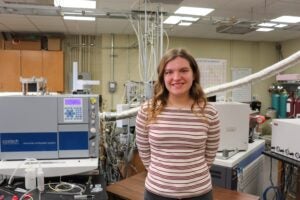
Sheril Kirshenbaum is a research associate with the Webber Energy Group at The University of Texas at Austin’s Center for International Energy and Environmental Policy where she works on projects to enhance public understanding of energy issues. Her new book, “The Science of Kissing,” explores the real chemistry, history and biology behind one of humanity’s fondest pastimes.
As Valentine’s Day approaches, kissing is a popular topic. And as the most intimate human experience, the right exchange has the power to start and maintain a special relationship when real chemistry is involved.
Why is kissing so significant? When we are that close to another person, all of our senses are engaged, allowing our bodies to assess compatibility and the potential for a long-term relationship. According to the work of Rutgers University anthropologist Helen Fisher, this behavior evolved to facilitate three essential needs: sex drive, romantic love and attachment. In other words, kissing helps us find partners, commit to one person and keep couples together long enough to have a child.

A good romantic kiss quickens our pulse and dilates our pupils, which is probably part of the reason so many of us close our eyes. Our brains receive more oxygen than normal and breathing can become irregular and deepen. Our cheeks flush, too, but that’s only the beginning.
There is an associated rise in the neurotransmitter dopamine, responsible for craving and desire. Meanwhile, serotonin spikes to stimulate obsessive thoughts about a partner. This is the same neurotransmitter involved in obsessive-compulsive disorder. Oxytocin, popularly called the “love hormone,” is involved in bonding, fostering a sense of attachment. This is the chemical likely responsible for maintaining a loving relationship over years and decades.
Notice anything? The hormones and neurotransmitters coursing through our brains and bodies are responsible for many of the “symptoms” we associate with falling in love.

Of course, sometimes a kiss does not go well and romantic feelings instantly change upon first contact. According to evolutionary psychologist Gordon Gallup of the University of Albany, 59 percent of men and 66 percent of women say they have ended a budding relationship because of a bad kiss. It turns out that our sense of smell may be partially responsible as we pick up subconscious clues about the other person’s DNA or reproductive status. Biologist Claus Wedekind found that women are most attracted to the scent of men who have a very different genetic code immune system than their own in a region known as the major histocompatibility complex (MHC). This may be because potential children would have a higher level of genetic diversity, making them healthier and more likely to survive. In this manner, kissing serves as nature’s ultimate litmus test to help us determine when to pursue a relationship.
No matter what the outcome, a first kiss is very likely to be unforgettable. Psychologist John Bohannon of Butler University and his research team surveyed 500 people to compare their recollections of a various important life experiences to determine what made the most lasting impression. A first kiss was found to create the most vivid memory and when asked about specifics, most people could recall up to 90 percent of the details of the moment regardless of how long ago it occurred.
Join me on Feb. 9 for Science Study Break where I’ll be talking about my new book “The Science of Kissing” by using some of film and television’s best kisses along the way. On Feb. 11, I’ll also be speaking at Science in the Pub at the Cactus Cafe.
Watch a video of a previous Science Study Break on movie monsters.



